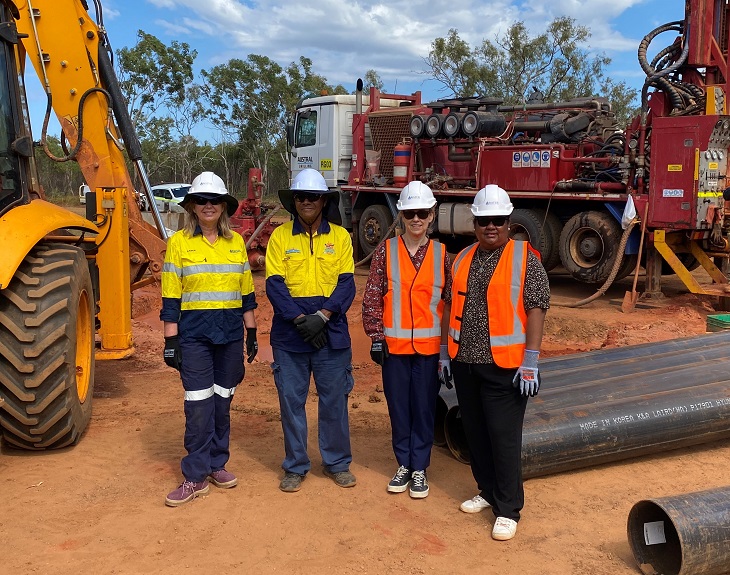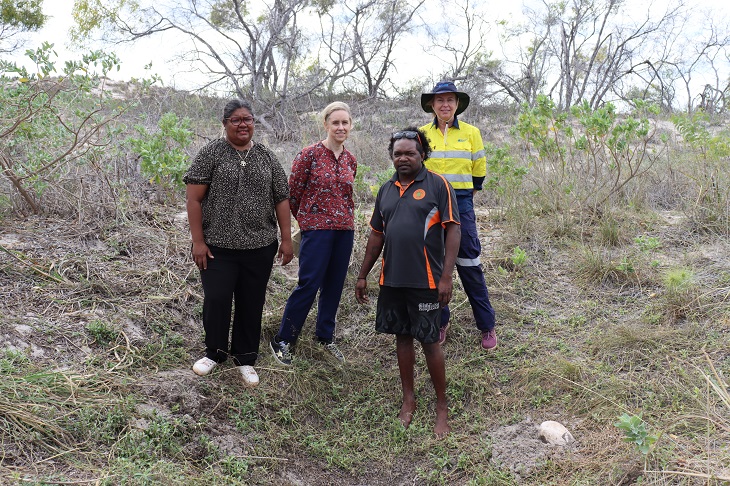New water source in Djarindjin marks brighter future

Water Corporation General Manager Customer and Community Karen Willis, Djarindjin Heritage Monitor Andrew Sampi, Water Minister Simone McGurk, and Kimberley MLA Divina D’Anna at the new borefield
- Djarindjin first to receive a new water source under community-led water services upgrade program for Aboriginal communities
- Initial tranche of $32.4 million investment in improved water infrastructure
- First anniversary of water services in 141 communities transferring to Water Corporation
- Cook Government raising the standard of water services in Aboriginal communities
Djarindjin, 170 kilometres north-east of Broome, is benefiting from a $20.4 million investment in new water infrastructure, as the Cook Government continues to lay the long-term foundations for safer and more reliable water services in Aboriginal communities across Western Australia.
The borefield for the Dampier Peninsula community is the first new water source being delivered since the WA Government transferred responsibility last year for water services in 141 Aboriginal communities to Water Corporation.
Marking the first anniversary of Water Corporation's Aboriginal Communities Water Services (ACWS) program, Water Minister Simone McGurk met community leaders in Djarindjin to see the program of works which will support population growth and enhance health and wellbeing outcomes.
In the 12 months since the transfer (1 July 2023), major upgrades to water services in five communities, including Djarindjin, have commenced or been completed, totalling $32.4 million:
- Ardyaloon: initial upgrades to the water reticulation network with new pipes, valves and realignment of existing pipes to address poor pressure and leakage issues ($500,000);
- Beagle Bay: installation of new water pipes and valves to improve reliability of the scheme ($264,000);
- Djarindjin: new water bores and borefield access track to provide a new long-term water source for Djarindjin and Lombadina ($20 million); and two co-designed liveability projects for a new community greenhouse and greening around community basketball courts ($350,000);
- Jigalong: repurposing and decommissioning existing wastewater treatment ponds to support the efficient operation of a new wastewater treatment plant ($1.3 million); and
- Mowanjum: upgrades to the community's wastewater treatment plant, becoming the first licensed wastewater treatment plant in an Aboriginal community ($8.3 million); co-designed liveability project to green and irrigate a community open space; and a minor works program, including the upgrading of a wastewater pump station and pipe renewals ($1.7 million).
In addition, Aboriginal contractors delivered $2 million of initial water network upgrades in eight town-based communities (Budulah, Burrinunga, Djimung Nguda, Karmulinunga, Badjaling, Bindi Bindi, Goodabinya and Irrungadji). These works included the installation of hydrants, valves, flushing points, water meters and new water services.
Several programs of work, totalling $13.2 million, have also commenced to address higher risk water quality issues and improve water quality testing across multiple communities. This is in parallel to scoping and planning more significant, longer-term infrastructure upgrades - including other potential new borefields - staged over an initial 10-year time frame.
Underpinned by a collaborative, engagement-led approach, the first 12 months of the ACWS program has initially focused on assessing the condition of existing water infrastructure and implementing enhanced water quality monitoring to better understand community requirements, helping identify priority upgrades.
To safeguard public health, a more robust escalation process has been established, in liaison with the Department of Health, to advise communities of any water quality issues. The increase in the number of community advisories is indicative of the enhanced water quality monitoring regime.
The 10-year (2023-2033) ACWS program will ensure Aboriginal communities have access to reliable drinking water that meets Australian Drinking Water Guidelines and wastewater services that meet or exceed relevant standards under the National Agreement on Closing the Gap.
Comments attributed to Water Minister Simone McGurk:
"This significant $20.4 million investment in Djarindjin is the latest milestone in delivering generational change to water services in our Aboriginal communities.
"The first year of the Aboriginal Communities Water Services program has focused on building partnerships with communities to identify critical water quality issues and implement short-term solutions while planning for the future, and already we have seen some great results.
"Importantly, Water Corporation has also established a robust water quality monitoring program to protect public health.
"This work is helping transform communities by helping to deliver wellbeing outcomes for people in these communities, while creating opportunities for local Aboriginal businesses that benefit the whole region."
Comments attributed to Aboriginal Affairs Minister Dr Tony Buti:
"We are committed to addressing water infrastructure challenges in Aboriginal communities, ensuring equitable access to essential services. This is a priority under our whole-of-government commitment to Closing the Gap.
"Aboriginal communities, like Djarindjin, are unique with their own aspirations and water services needs, so I welcome the responsive, Aboriginal-led approach Water Corporation has adopted to deliver these progressive upgrades.
"While it will take time, we have a clear pathway under the Cook Government to raise essential service standards across our Aboriginal communities, and further progress our State's reconciliation journey."
Comments attributed to Kimberley MLA Divina D'Anna:
"Access to clean and reliable water is a fundamental human right, and Water Corporation's long-term program is vital to delivering improved health and wellbeing outcomes.
"In Djarindjin and elsewhere, these staged upgrades will make a difference to everyday life, helping our people and communities thrive.
"Employing Aboriginal people, where possible, has given an Aboriginal voice to Water Corporation's community engagement and project delivery, helping deliver better outcomes for this vital work."
Water Corporation's Aboriginal Communities Water Services fact file
- Water Corporation's Aboriginal Communities Water Services program manages water services in 141 Aboriginal communities across WA.
- Staged over 10 years, it is delivering water infrastructure upgrades to provide safer and more reliable water services.
- The 141 communities, of varying sizes, are located in:
- Kimberley (101 communities);
- Pilbara and Mid West (26 communities); and
- Goldfields and Central (14 communities).
- Water Corporation has overall management of the services with operational support delivered by existing local and Aboriginal-owned regional service providers, who maintain the water services and infrastructure.
- Improved water quality monitoring and reporting has been implemented to better understand individual requirements and identify potential improvements, following comprehensive infrastructure condition assessments.
- Communities with critical water service concerns, such as operational safety, water quality and water reliability, are being prioritised for upgrades.
- Aboriginal staff are employed, where possible, to ensure an Aboriginal-informed approach to engagement, consultation, and program and service delivery.
- The program will deliver water services that meet or exceed the relevant standard under the National Agreement on Closing the Gap.
- Previously, management of water services in these communities sat with Department of Communities before the WA Government transferred responsibility to Water Corporation on 1 July 2023.
For further information on ACWS, visit: watercorporation.com.au/ACWS

Kimberley MLA Divina D'Anna, Water Minister SImone McGurk, and Water Corporation General Manager Customer and Community Karen Willis were taken to Djarindjin's original water source